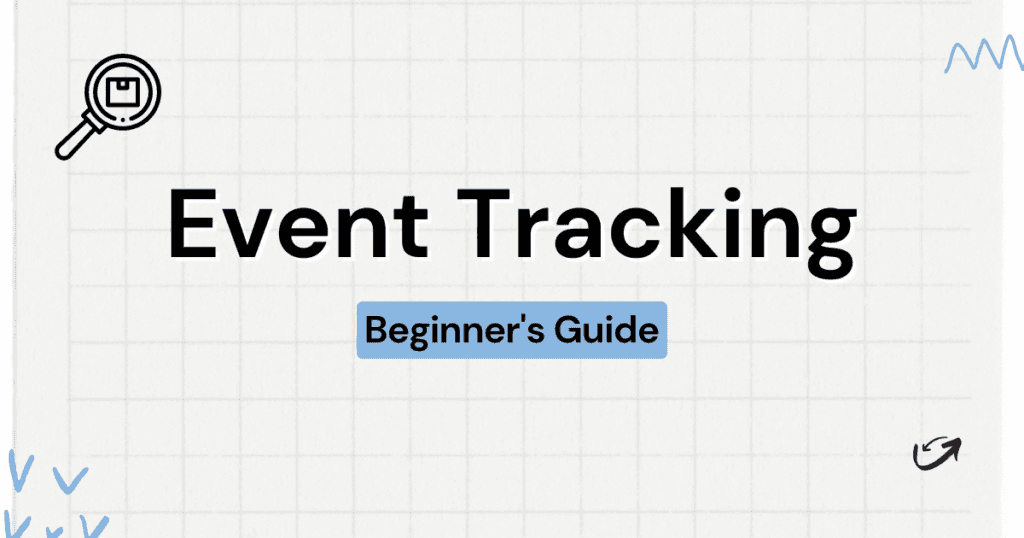
Iterate AI
Sep 14, 2024
Nowadays, understanding your audience has become important, as the marketing strategies and UX are enhanced and optimized by data-driven insights.
That's where event tracking comes in, a tool that helps businesses understand user behavior and preferences. In this guide, we will learn:
What is event tracking?
Pitfalls in event tracking?
Important event tracking tools
Applications of event tracking
Let's start...
What Exactly is Event Tracking?
Event tracking is a method to monitor specific actions (which are events) done by users on websites, mobile apps, or any digital environment. These events include clicks, form submissions, purchases, page opens, and even pointer tracking.
Why does event tracking matter?
In this data-driven world, flying blind is not an option. For businesses, event tracking matters a lot. Here is why:
Insights: It helps businesses understand user interactions in a detailed way and creates/makes trend possibilities for further optimization.
Personalization: Businesses can tailor user experiences and communications to individual preferences that can improve engagement and conversion rates.
Enhanced User Experience: Insights from event tracking can help identify pain points that users face while navigating the product and areas that require changes that can ultimately lead to increased user satisfaction and loyalty.
Optimized Campaigns: Event tracking enables marketers to measure the effectiveness of their campaigns by linking specific user actions to marketing efforts; this allows real-time adjustments.
Understanding these points, you can make out that the need is real. As you:
You need to understand how users interact with your website/mobile app; a clear picture will enable businesses to customize and optimize their strategies.
With detailed analytics in hand, you can prioritize features or content that users prefer, enhancing product development and marketing strategies.
Read about 20+ Web Analytics tools in 2024.
Types of Events You Should Track
As you get a gist of what event tracking is and why it matters, let us categorize the types of events and understand what matters most to your business.
Core Events
Core events are the main (or general) user interactions that provide insights into how visitors engage.
Clicks: Tracking clicks on various elements, such as buttons, links, or images, shows the user interest and helps identify popular content or CTAs.
Form Submissions: Tracking form submissions, which can be contact inquiries, newsletter signups, or lead generation, allows you to measure the effectiveness of your lead capture efforts going on.
Downloads: Tracking downloads of files, documents, or assets helps track user interest in specific content forms (eBooks, graphics, software) and can inform content marketing strategies.
Engagement Events
Engagement events provide a deeper understanding of how users interact with your website or app over time.
Scrolls: Tracking scroll depth (and scroll speed) on pages helps track content that users love to see and areas where users are losing interest.
Video Plays: Monitoring video engagement, such as play, pause, and completion rates, gives insights into the effectiveness of your video content. It includes tracking play rate, pause and replay, completion rate, etc.
Time on Page: Tracking the time users spend on individual pages can help determine the relevance and value of your content.
Widget Interactions: tracking interactions with chatbots to understand how often the user is coming back for help or inquiries; tracking polls and quizzes to measure participation, and track user engagement.
Conversion Events
Conversion events are the most critical interactions that directly impact the business goals.
Purchases:
Product Views: Track how many users view specific products before purchasing.
Cart Additions: To track how many users add items to their cart to assess what product is gaining more interest.
Abandoned Carts: Track users who leave without completing a purchase and send them coupons.
Sign-Ups:
Trial Sign-Ups: Sign-ups for free trials or demos to see interest in offerings.
Membership Registrations: Track registrations for membership sites or exclusive content.
Paid Trial Cancellation: tracking how many paid trials are being canceled to find a pattern of user interest.
Technical Events
Technical events focus on the performance and functionality of a website or app.
Load Times: Page load speed, Time to First Byte, and some essential tracking events to measure the time it takes to load pages and how the server responds to requests, respectively, and enhance UX accordingly.
Errors: Monitoring errors, such as 404 pages or JavaScript errors, helps identify and fix technical issues that may impact the user experience.
API Calls: Tracking API calls can provide data on the performance and usage of your API.
Now understanding this, you would have built a picture of user behavior and site performance.
Common Pitfalls in Event Tracking and How to Avoid Them
As far as we discussed, event tracking can provide valuable insights. But it is common to fall into some common problems that will affect it soon. Let's discuss them.
Finding the Balance Between Valuable Insights and Data Overload
It is very tempting to track every possible event, but this can lead to a deluge of data that will make it difficult to understand meaningful insights.
To get to the right balance:
Prioritize events with your business goals and KPIs.
Avoid tracking redundant events with small actionable values.
Regularly review your event tracking strategy and remove unnecessary events.
Ensuring accurate data interpretation
Misinterpreting event data can lead to poor decisions.
You can prevent this by:
Having clear naming conventions for events, categories, and labels.
Involving different teams (product, marketing, dev) in defining events to ensure shared understanding.
Regularly assessing your event data for accuracy.
Isolated data can limit the effectiveness.
Tracking events in isolation will not help in gaining detailed insights.
To increase the tracking efforts:
Connect your event tracking data with other platforms, such as CRMs, email marketing tools, and analytics software. This integration will help you with a 360 view of user interactions across different channels.
Using a customer data platform to consolidate data from various sources. This will help in building a complete picture of user behavior, preferences, and engagement patterns.
Analyze event data within the broader context of the customer journey. Understanding how events relate to each other and to overall business objectives can help you with deep insights and inform strategic decisions.
Essential Event Tracking Tools
We know what event tracking is, what it does, and using it, what will happen. But how to track events? There are multiple tools on the market; we have chosen some tools for you; let's take a look.
Google Analytics 4 (GA4)
GA4, or Google Analytics 4, is a default analytics platform for most businesses that helps them track and analyze user interactions across websites and apps.
Key Features:
Automatically tracks events like page views, scrolls, and outbound clicks without needing additional code.
Offers insights based on user journeys, allowing businesses to understand how users engage over time.
It is ideal for businesses of all sizes looking for a comprehensive, free solution to track general website performance. It’s not the best fit for tracking web apps because they have deeper user interaction, and GA doesn’t fit in that use case.
See how GA4 compares with Mixpanel and Amplitude.
Mixpanel
Mixpanel is an advanced analytics tool that focuses on tracking user interactions and behaviors within applications.
Key Features:
Advanced Analytics: Offers powerful cohort analysis and funnel tracking to understand user behavior deeply.
A/B Testing: Allows businesses to test different features or content to see what resonates best with users.
It is best for product teams and marketers in tech companies who need detailed insights into user interactions and want to optimize product features.
Read how Mixpanel compares with Amplitude.
Amplitude
Amplitude is a product analytics platform that helps businesses understand user behavior and improve product experiences.
Key Features:
Behavioral Cohorts: Allows businesses to segment users based on their behavior for targeted analysis.
Retention Analysis: Provides insights into user retention and engagement over time.
Amplitude is best for data-driven companies looking to enhance product development and marketing strategies through detailed behavioral analytics.
We have compiled a list of 20+ event tracking tools and categorized them into different categories; it will not be hard to find the perfect tools for your use case; do give it a read.
Segment
Segment is CDP (customer data platform) that centralizes the data from different sources. It makes it easier to manage and analyze.
Its key features:
Data Integration: seamlessly connects with multiple analytics and marketing tools, centralizing user data for better insights.
Custom Event Tracking: Allows businesses to define and track specific user interactions tailored to their specific needs.
It is best for medium- to large businesses that can afford, and require a robust data infrastructure and want to unify data from various sources for deeper analysis.
What’s next?
Event tracking has become the only tool for businesses to enhance UX and optimize marketing strategies. As you implement event tracking, make sure to give priority to events that matter, name them good, and connect the data with other tools for a 360 view of what is happening.
PS: We are tracking who all have come down till here 😉.
